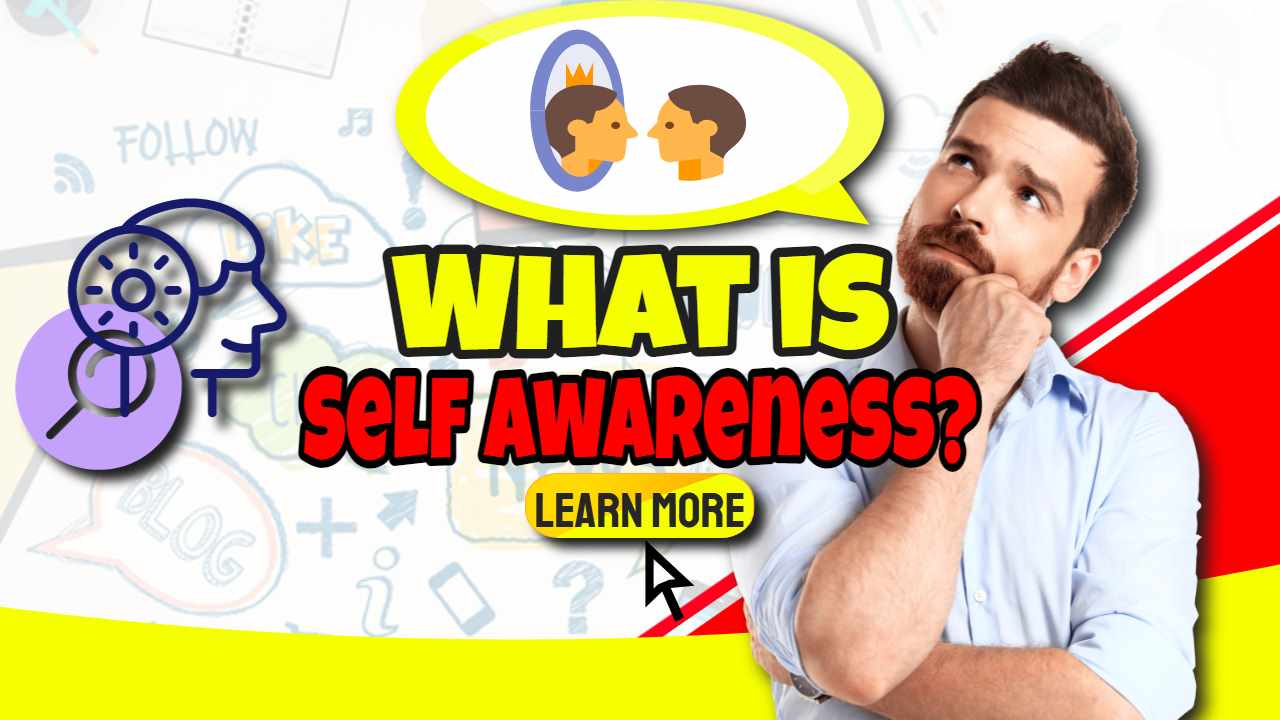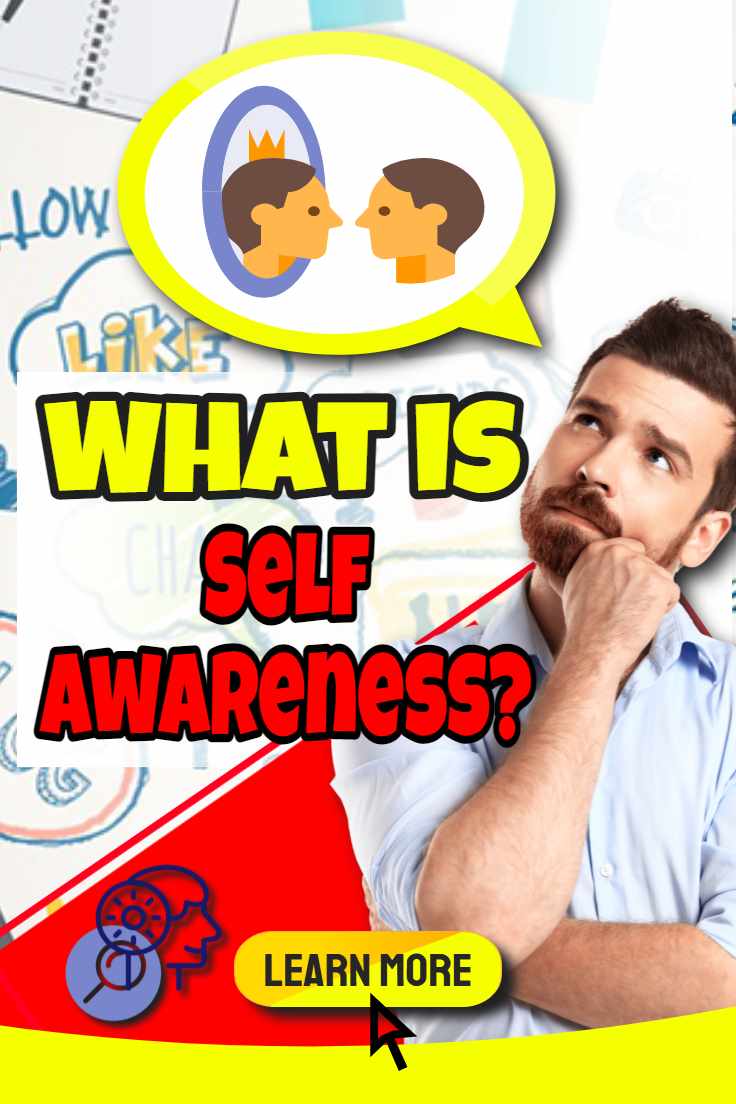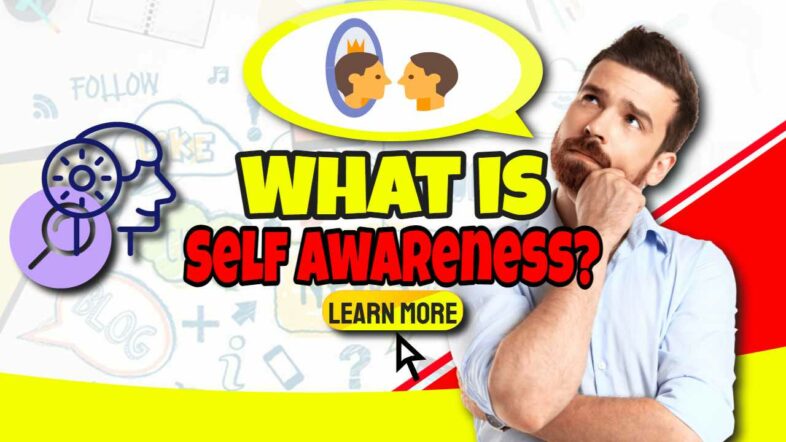On This Page:
- What Is Self-Awareness and Why Does It Matter?
- What Is Self-Awareness Theory?
- What Self-Awareness Really Is (and How to Cultivate It)
- The Two Types of Self-Awareness
- What is self-awareness, and why is it important?
- How do I know if I'm a self-aware person?
- What is it? And how can you cultivate it?
- Self Awareness – Who Am I?
- What Does “Awareness” Mean?
- Examples Of Self-Awareness
- What is it in simple words?
- Why is it so important?
- How do you apply self-awareness in your everyday life?
- What Self Awareness Really Is (and How to Develop It)
- Self-awareness involves seeing ourselves clearly
Understanding why you want the things you want is a crucial element of self-awareness. There is always a “why” behind everything you do. This applies from what you consume to the objectives you set for yourself.
Watch our video below for an introduction to Self Awareness and the things we talk about in this article. Watch and read on:
When we are out of touch with ourselves, we may make decisions that are not fully suited to what we truly desire. “You want a connection, not a cookie,” explains Melissa Hartwig Urban.
In general, it is critical because it enables us to make necessary changes in our lives as we get a better understanding of ourselves.
The capacity to observe your own emotions and reactions is referred to as self-awareness. According to research, persons who have a high level of it make better leaders. Setting limits and exercising self-discipline are two methods to increase self-awareness.
This article is for job seekers and leaders who desire to become more self-aware.
There are plenty of excellent strategies to improve yourself. One of these methods is to search for and appreciate the positive aspects of yourself.
Another crucial aspect of becoming a better person is recognising your flaws and actively attempting to improve. These two self-improvement approaches describe what it means to be self-aware. Being self-aware can help you relate better with others and achieve your goals more effectively.
What Is Self-Awareness Theory?
William James distinguished between the subjective and objective self in the late 1800s. Many psychologists have been interested in self-awareness since then (Brownell, Zerwas, & Ramani, 2007).
The effort to understand when the self develops, why it is significant, and what it implies in human development is continuing. According to developmental theory, children become self-aware at the age of 18 months (Brownell et al).
There are concerns over which region of the brain permits us to be self-aware and how we are biologically built to be self-aware. Mirror neurons, according to V. S. Ramachandran, may offer the neurological basis for human self-awareness.
In this way, the theory of mind is more analogous to most children's ability to sing confidently and without self-consciousness. They perform it with perfect pitch and rhythm, and at times loudly and enthusiastically. This skill is most likely a result of genetics and early musical exposure.
What It Really Is (and How to Cultivate It)
We can't develop self-awareness until we practise active listening. It's an important talent to develop for these and many more reasons.
We should strive to build active listening skills. Why? because it enables us to empathise, comprehend, get knowledge, learn, and even have fun The term “active listening” refers to the ability to “focus, understand, reply, and then recall what is being said.”
But, exactly, what does it mean to be self-aware? How did it become a venerable attribute, and how might it be cultivated?
The phrase self-awareness may probably be traced back to Freud and Jung, but in current vernacular, I think it got back on the radar about the time Daniel Goleman wrote 'emotional intelligence' over two decades ago,” explains clinical psychologist and author John Duffy.
Professional coaches use strategies to assist people to develop a sense of self-awareness. The following is a typical statement made in feedback to those being considered for advancement at work: He or she is technically proficient but lacks it.
And, in a difficult relationship, it is frequently seen that the pair appears unable to recognise the role each plays in the turbulence they are experiencing due to each's lack of awareness of his or her involvement in what transpires.
The Two Types of Self-Awareness
There are two sorts of self-awareness. These are internal and exterior self-awareness, both of which are essential for your personal development. Learn about the differences and how to improve your talents.
Just because you believe you are talented in one sort of it does not always imply that you are proficient in both.
In reality, “our study has discovered absolutely no association between [the two forms of it],” according to Eurich (Eurich, 2018). According to their findings, leaders should not prioritise one sort of it above another.
There are several advantages to being able to manage and control your emotions.
Individuals who are self-aware can reframe things such that they are viewed positively rather than negatively. However, it is equally vital to recognise that we frequently have little influence over external variables in our life.

What is it, and why is it important?
Consider solely what is essential to them and not how their actions affect others. Recognize that everyone requires time alone in order to re-energize. Understand what talents they are skilled at and what abilities they can improve on.
They believe they have the right to act in the workplace whatever they see suitable. Fail to understand the negative effects of selecting a profession that is not a good match for their abilities and skills.
It necessitates you acting like a detective, examining yourself to discover who you are and what is important to you, and then acting on what you've discovered to design your life appropriately. Self-awareness does not happen by accident.
You must decide to pursue it and explore the many facets of the one-of-a-kind individual known as you. This approach might be intimidating at times since it encourages you to unearth and confront aspects of yourself that may not be so appealing.
Journaling has the advantage of allowing you to recognise, clarify, and embrace your ideas and feelings.
It assists you in determining what you want, what you value, and what works best for you. It may also assist you in determining what you don't want, what isn't vital to you, and what doesn't work for you. Both are equally essential to learn.
How do I know if I'm a self-aware person?
This understanding, along with a drive to learn more about oneself and others.
Individuals are able to raise their levels of self-awareness. This programme helps people better understand their own strengths and shortcomings, as well as become more conscious of their emotions and how they affect others.
In our daily lives, this translates to greater self-awareness and understanding of others, which may lead to actionable and focused improvements for stronger personal connections.
What is self-awareness? And how can you cultivate it?
You're probably wondering how you might improve your self-awareness now that you've found it. There are several strategies to increase and grow it, but here are four of the most important to get you started.
Instead of asking “why?” ask “what?” When people evaluate their present condition, feelings, and surroundings, they frequently question, “why?” “Why am I feeling so sad?” Why did my supervisor provide me with such feedback? “Why isn't my project progressing as I'd hoped?”
Although it is not a permanent characteristic, it may be developed. A person may constantly strive to improve their self-awareness and conscience.
A person will never progress if they do not work on being more self-aware than they were before. Goals, passions, and values may be evaluated by assessing them via awareness. If a person wants to achieve a certain goal, he or she must be informed of the measures that must be performed.
However, in both experiments, the self-aware students did not experience stronger emotional empathy. It appears that the ability to define, explain, and process one's own sentiments are connected to knowing what others are feeling but not necessarily having those sensations oneself.
Self-awareness might appear to be a difficult talent to learn for people who struggle with it, but research published in mindfulness gives some assistance.
Who Am I?
 Counsellors may have reservations about their professional decision as counselling students, early in their careers, or even after many years of practice. Counsellors might benefit from it not only clinically, but also emotionally.
Counsellors may have reservations about their professional decision as counselling students, early in their careers, or even after many years of practice. Counsellors might benefit from it not only clinically, but also emotionally.
Having access to this inner knowledge allows you to reconnect with the reasons you decided to be a counsellor in the first place. This serves as a reminder of why you choose to attend school or work in your industry.
For good cause, self-awareness appears to be the newest managerial buzzword. According to research, when we view ourselves clearly, we are more confident and creative.
We make better judgments, form stronger bonds, and communicate more effectively. We are less prone to deceive, cheat, or steal. We are better workers who get promoted more frequently. And we're more successful leaders, with happier workers and more lucrative businesses.
For over 15 years, I've had a front-row seat to the impact of leadership self-awareness as an organisational psychologist and executive coach. I've also witnessed how easily this talent can be acquired. However, when I first began to look into the study on it, I was astounded by the wide disparity between science and practice of it.
What happens next? Now that you've (hopefully) recognised your lack of self-awareness, you may work on improving it. It will not happen all at once, nor will you ever obtain the ideal end product (which is why many people give up the pursuit).
However, if you commit to these three things, you will be astounded by the long-term effects they will have on your life.
What Does “Awareness” Mean?
Keeping a mindfulness diary (and experimenting with the power of mindfulness journal prompts) can assist us in delving more deeply into who we are and what we are experiencing.
Journaling allows us to communicate our ideas and feelings in a safe and honest manner. The use of mindful writing prompts in journals supports this process by urging us to connect to our experiences with open, questioning, and loving awareness.
) As you lean into your strengths to become a better version of yourself, you may utilise this idealised self to stay on track and avoid being sidetracked by setbacks and other hurdles. Inquire about the “what.” The ability to self-reflect is important to self-awareness.
The Eurich Group, on the other hand, believes that most individuals approach reflection incorrectly. Rather than being preoccupied with what others think of her, she will actively listen for indications to ask important questions that advance the conversation.
With heightened awareness of her body's signs suggesting dread and anxiety, she'll identify the feeling at the moment and choose not to be overwhelmed by it – a big step toward self-awareness.
Face-to-face semistructured interviews were done with a purposive sample of 13 nurses at two hospitals in Pakistan from October to December 2018. For data analysis, thematic analysis was performed. There were five themes and 13 subthemes developed.
The subjects covered the definition of self-awareness as a personal, professional, and conscientious trait, the relevance of it for nurses, self-aware nurses and their influence on patient care, self-aware behaviours and activities, and what is required to improve it.
Examples Of Self-Awareness
It is essential to have excellent social awareness abilities in both your personal and professional life. Let's look at some examples of folks who have excellent social awareness and others who might do better. Eugenia is the CEO of a large corporation. On the day of her staff meeting, she stormed into the room, eager to get down to business.
This makes it much more crucial for us to maintain some level of self-control. Even while external variables influence a large portion of our pleasure, we have power over how we react to these external factors.
This is where self-awareness comes into play. You may vastly enhance your life by incorporating its practice and examples into your daily existence. We can't control everything in our life, but we can frequently influence how we react to the things we can't.
What is it in simple words?
Although it appears to be empty at first look, awareness conceals the deepest secret—the mystery of existence, the reality of God—within its depths.
God awakens as the fundamental basis of our existence in self-awareness. We see it as a distinct sense of becoming increasingly awake, beyond words and thoughts.
What we pay attention to grows over time, and a mere moment of acknowledging what it means to be awake is enough to dissolve separation… for a minute.
Why is self-awareness so important?
Self-awareness is the ability to look at your life objectively, without regard for whether it is right or wrong, good or terrible. If you don't have emotional talents, if you don't have them, you can't manage your stressful emotions. If you can't have empathy and have good relationships, no matter how clever you are, you won't get very far.
Self-awareness allows you to learn from both your failures and your triumphs. It allows you to continue growing. Wisdom grows in direct proportion to one's understanding of one's own ignorance. I'll be liberated once I figure out who I am.
Self-awareness entails being aware of many parts of oneself, such as qualities, behaviours, and feelings. It is essentially a psychological condition in which one becomes the centre of attention.
While self-awareness is an important aspect of who you are, it is not something you are intensely focused on at all times. It, on the other hand, becomes woven into the fabric of who you are and emerges at different moments depending on the scenario and your personality. People are not born with it. However, studies have revealed that neonates develop a basic sense of self-awareness.
I ran two surveys on LinkedIn last week. One person inquired about internal self-awareness, or how we see our own values, ideas, and feelings. The other person inquired about external self-awareness, or our ability to recognise how we appear to others.
Here are the outcomes: The first poll's findings did not surprise me, but they might surprise you. 78% of those polled felt they were good at internal self-awareness.
On the contrary, author Dr Tasha Eurich claims that “despite the fact that most individuals feel they are self-aware, self-awareness is a very unusual quality: we estimate that about 10%–15% of the people we surveyed actually fulfil the criteria.”
How do you apply self-awareness in your everyday life?
How do you know when you're constantly using self-awareness in your daily life? You will feel more confident and less stressed and depressed if you live your life more mindfully. To achieve more and have a better life, do things with a feeling of purpose and an awareness of your personality. You have the ability to detect and manage your emotions, thoughts, and behaviour.
What Self Awareness Really Is (and How to Develop It)
Developing intuitive decision-making abilities: – Leaders who are emotionally self-aware are more effective intuitive decision-makers. In complicated situations, intuitive decision-makers evaluate enormous volumes of potentially unstructured and confusing data and determine a course of action based on a “gut” feeling of what is best.
This form of decision making is becoming increasingly critical for managers as the velocity of change, unpredictability, and complexity in their competitive contexts rise. It is really tough to deal with failure. Self-awareness is powerful since it may highlight where performance issues exist and what can be done to enhance performance.
Furthermore, being aware of your psychological requirements may boost your motivation by assisting you in understanding and seeking out the rewards that you truly desire, such as a sense of success, increased responsibility, the ability to serve others, or a flexible work schedule.
Why do some people have difficulty determining what has to be done to finish a task? or identifying and correcting errors in their work? People that are self-aware are better able to keep track of what they are doing. This is known as self-monitoring.
Self-awareness also aids in self-reflection, which is the process of reflecting on what happened in order to identify methods to make things work better the next time. What is working and what isn't? It can also assist people in speaking out for what they require, or in self-advocating.
The truth is that you may be mature adults who lack self-awareness. If that's the case, the issue becomes, why and how should we expect children to get it? The answer is simple: people of all ages appreciate self-awareness since it helps us create our characteristics in the eyes of others. In our homes, classrooms, and workplaces.
Conclusion – Self-awareness involves seeing ourselves clearly
Self-awareness is defined as a “combination of self-knowledge and the development of dual-awareness, a posture that allows the clinician to listen to and monitor the requirements of the patient, the work environment, and his or her own subjective experience.”
It entails keeping track of our stress, thoughts, emotions, and beliefs.
It is significant because it is a significant process impacting personal growth.
Our lives may quickly spiral out of control if we are unaware of how and under what conditions our emotional nature is awakened (for example, we might not realise how much social media upset us). Mindfulness entails paying attention in the present moment to whatever one is doing and includes activities such as meditation or mind quieting.
Self-awareness is a dynamic process that evolves through time. Our sentiments and ideas in life change all the time as we mature.
Those who have a development attitude are more likely to be exposed to change on a regular basis. So, make it a point to frequently pause and reflect on where you are and where you want to go. In all of these circumstances, make a note of how you feel.



